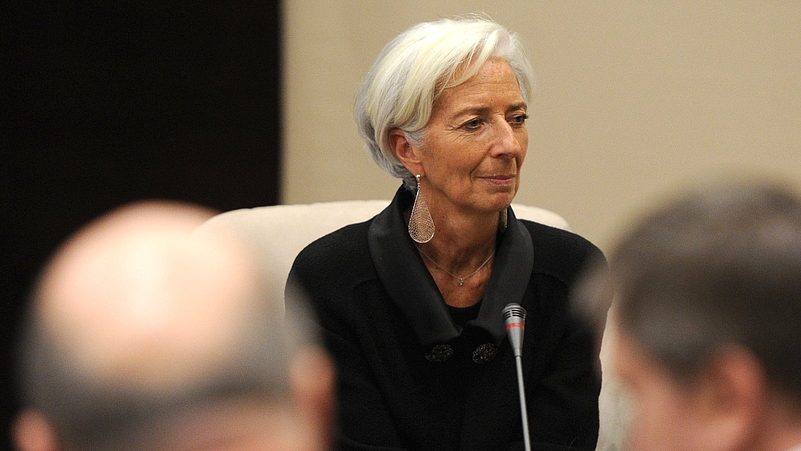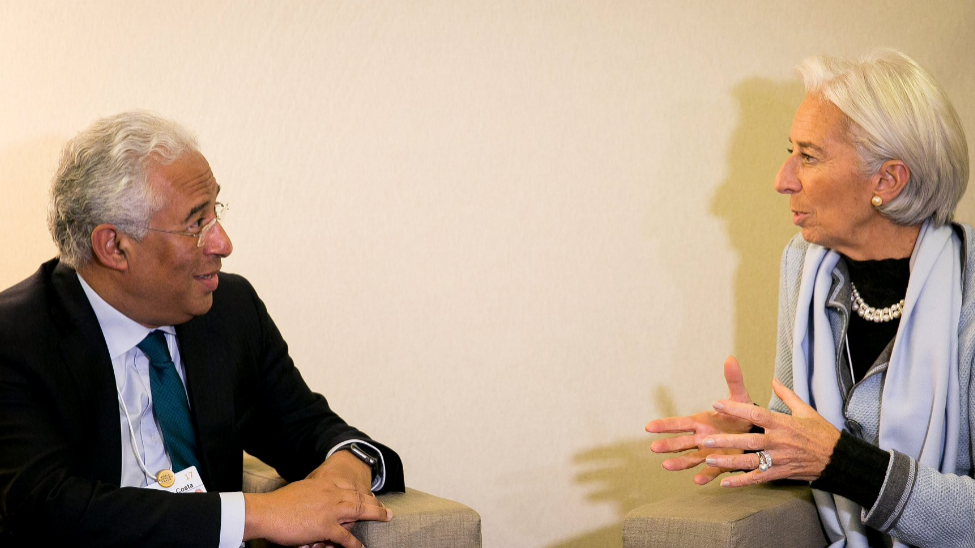IMF: Nine warnings and three compliments to Portugal
Difficulties in recruiting qualified workers, external shocks and fear of changes in the labor law. These are some of the warnings left by IMF, which commends banking and fiscal consolidation.
The International Monetary Fund (IMF) disclosed, this Tuesday, its conclusions concerning the Article IV Mission. IMF acknowledges that the Portuguese economy has made significant progress. The institution headed by Christine Lagarde has presented favorable prospects for Portugal’s future, but has also left some warnings against several issues, which go from extreme risks to vulnerabilities such as difficulties in recruiting qualified workers to the impact that changing the labor law might have on the Portuguese economy.
👍 Growth is significant and prospects are favorable…
This is the first and most obvious compliment IMF makes to Portugal. “Job rich growth continued in the last year, supported by a pickup in investment and exports, and prospects remain largely favorable”, is read in a press release sent by IMF, this Tuesday.
This acknowledgement was given by IMF after the Portuguese GDP 2.7% growth last year, an amount that surpassed all expectations. As for this year, the Government anticipates that the Portuguese economy will grow 2.3%, a forecast made by IMF itself.
👎… But there are temporary factors explaining this growth
On the same chapter commending the progress of the Portuguese economy, IMF warns against some factors that are contributing to that growth. If it is certain that the evolution of “investment and exports of goods and services — notably tourism” — justify last year’s GDP acceleration, the mission technicians highlight that “flash statistics for the first quarter of 2018 showed somewhat subdued growth largely on account of temporary factors affecting exports, and possibly also of moderation of demand in some export markets”.
👎… And there are even difficulties in hiring qualified workers
There’s more: if it is undeniable that the workforce is recovering, with an unemployment rate standing at 7.4% in March — an amount that stands below the Euro Area average –, and a reduction in the number of “labor under-utilization”, a new problem arises. “In some sectors of the economy, firms are beginning to find it difficult to fill vacancies, especially for high-skill jobs”. Simultaneously, and although the average salary has increased, the proportion of workers receiving minimum wage has also rised, which, IMF believes, “reflects in part the growth in low-skill positions”.
👍 Even so, the consolidation was “significant”
In spite of the setbacks that Portugal’s economic growth may face, the fiscal consolidation achieved last year was “significant”, thanks to a “disciplined budget execution”. This “strong” fiscal performance lead to indirect positive effects to the economy, such as the reduction of the sovereign debt risk. In that context, the goal set by the Government for the deficit for this year, of 0.7%, “seems attainable”, IMF acknowledges, yet only if the focus remains placed on expense and if the positive cycle the economy is going through is elongated.
👎… But significant risks threaten that consolidation
Growth is significant, and so is the budgetary consolidation, but neither can be taken for granted. Firstly, because there are external and domestic risks that threaten Portugal. Internationally, IMF points to a “political uncertainty in some of Portugal’s partner countries”, as well as to the “volatility” of exchange and bond markets. “This is a reminder that external conditions, while still broadly benign, can turn less favorable”, IMF states. Internally, Portugal has a high level of indebtedness, so “surprises” with interest rates can have a relevant impact on the economy.
👎… And goals to reduce debt should be anticipated
The goals for the deficit and the reduction of sovereign debt are not only attainable, but should be achieved sooner than the Government’s plans. “The favorable environment provides an opportunity to make faster progress in the reduction of public indebtedness”, IMF states. Nonetheless, it acknowledges the goals inscribed in the 2018-2022 Stability Programme are “ambitious”. The document states that the Government points to a 0.7% deficit for this year in 2018, a 0.2% deficit in 2019 and anticipates a surplus in 2020 of 0.7%. However, by then, IMF anticipates the economic growth will be decelerating; also, the uncertainty about the macroeconomic perspectives is larger in the furthest years of the forecast. So, IMF advises, the best thing to do would be to achieve these goals for fiscal consolidation as soon as possible, not only to avoid the risk of turning these policies into “pro-cyclical”, but also to assure that the forecasted adjustment is “robust” enough to resist “surprises along the way”.
👎Increases? Expense has to be reigned in
“Containing the growth in the government wage bill and pension spending is key to keeping current expenditure growth moderate while safeguarding the quality of public services and public investment”, IMF warns.
👍 Banking gets a positive grade
The Portuguese banking also deserves a compliment from IMF, after one year of registering “significant improvements in financial stability”. The assessment is clear: the capital ratios were reinforced and NPL level was reduced in 13 billion euros since it reached its peak in 2016, reaching a consistent rhythm of NPL, “meeting or exceeding the banks’ NPL reduction objectives”.
👎… But it’s not an A+
Once again, the compliment does not come without a warning: “Moreover, supervisors should continue to encourage banks to strengthen further their corporate governance and risk management while persevering in their NPL-reduction and cost-cutting strategies to generate internal capital“.
👎… And it must pay attention to real estate
The real estate worsens the perspectives for the financial sector. Once again, and just like other international institutions, IMF warns against the increase of house prices, which should be “monitored”, considering the weight housing credit has on the overall credit granted by Portuguese banks.
👎 Reforms that must be solved
IMF mentions the “reforms” that have been implemented and that must continue being developed, in order to achieve a “faster” growth in the medium term. That is the case of the bet on education, in order to increase the qualifications of the active labor force, and the promotion of investment by means of improving the conditions presented to business people. The “streamlining excess regulations”, the improvement in “corporate restructuring and liquidation processes”, as well as an increase in “the flexibility of institutions and markets”, are some of the examples highlighted by IMF.
👎… And those that must be stopped
Simultaneously, IMF warns against the need to not go back to the flexibility in the labor market, as the Government and social partners are discussing changed to the Labor Code. This scenario could jeopardize “labor reforms undertaken in past years that have facilitated the job-rich character of the recovery currently underway”. Therefore, introducing new “rigid” measures, or recovering old ones, “would undermine competitiveness and productivity” of the Portuguese economy, and, at the same time, “make it difficult for firms to manage fluctuations in demand”.




